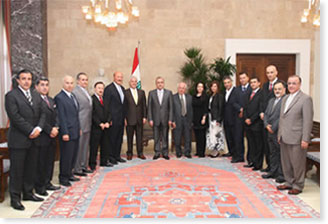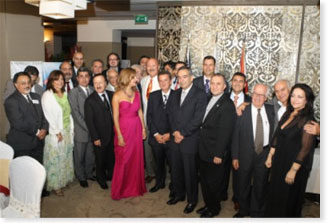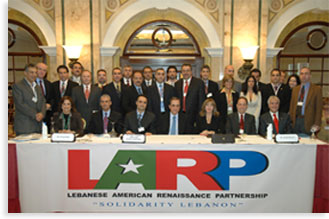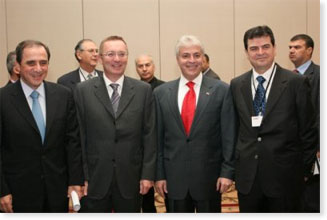February 16, 2007 by Steve Kauffman
Lebanese - American Group Seak Partnership with US Government.
Aid agency offers grant opportunities for expatriates with program ideas
Washington -- Some Lebanese Americans with deep links to their homeland are turning to the U.S. government for assistance in helping their former towns and communities recover from the country’s long civil war and its involvement in regional conflicts.
At a February 16 meeting in Washington, representatives from the Lebanese American Renaissance Partnership (LARP) and the U.S. Agency for International Development (USAID) discussed how to match aid project ideas with U.S. government grant money.
Ray Debbane, who heads a New York investment firm, described LARP as a group of Lebanese-American businessmen and professionals from across the United States who are combining their creative efforts to find ways to help Lebanon.
Every year, members of the partnership travel to Lebanon to meet local officials, assess development needs and programs, and tap into a network of skills that they then can provide to their home country. Most recently, the group visited in November 2006 to assess the situation after the summer conflict between Israel and Hezbollah and to express their support for the Lebanese government.
“Each one of us has their own network locally [in Lebanon],” he told USINFO. “I think between all of us we have access to a lot of contacts, and therefore … through the network we should be able to go and find the right person, the right idea, and the right advice … to be in a position to provide something.”
His organization set up a foundation that provides educational programs, therapy and job training for handicapped children in Lebanon who are unable to participate in the country’s normal educational system. The organization now is seeking to expand beyond its center in Beirut, Lebanon, to operate in Tripoli, Lebanon, and southern Lebanon.
Such an expansion will require significant financial support. And so Debbane, as well as other members of LARP, came to Washington to learn about how USAID potentially can support their work.
Jeff Grieco, USAID’s deputy assistant administrator for legislative and public affairs, explained that the agency awards grants either by offering contracts for specific programs for companies to bid on, or evaluating proposals submitted by private individuals such as Debbane.
“Come and tell us what you propose and our grant committee … will review your proposal,” Grieco told the LARP representatives. The committee then might offer suggestions, such as additional aspects for the program or other areas of the country in which to pursue it. “They’ll ask you to amend your grant proposal, and then you get to come back in, and then they award,” he said.
USAID has a budget of $24 billion for programs worldwide and private individuals are eligible to make use of those funds for their own aid program ideas. Grieco acknowledged that because the agency is accountable to the U.S. Congress for spending U.S. taxpayer dollars, “there is a lot of paperwork” involved. But he offered the Lebanese-American representatives training sessions designed to educate them about the process and thereby increase their likelihood of receiving a grant.
“[O]nce you’ve done a successful grant, you learn so much about the process that you can apply that over and over each time so it’s easier for you to get,” he said, adding that for that reason it sometimes seems that the same companies are able to get the grants.
Debbane said the meeting was “very helpful” for his understanding of “how to harness this resource” and obtain the U.S. government assistance.
“I wasn’t even aware of the mechanism to access those kinds of grants. I mean, we’re talking about significant budgeting potential over there. We have needs on the ground and we had never even thought of applying to USAID programs, not knowing what the mechanism was,” he said.
Ed Fox, assistant administrator for USAID's legislative and public affairs section, said the Lebanese Americans in turn can help the agency improve the effectiveness of its programs.
“Working with the diaspora communities is an important part of what we do because we know you understand the challenges that we have overseas better than most Americans do,” he told them.
“You understand the importance of these kinds of efforts,” he said, adding that it is invaluable for USAID to benefit from those “who have the language and culture and understanding that are important for us to be able to do our job, not only in a disaster but also for long-term development.”
Combining the 2006 Lebanon donor’s conference in Stockholm, Sweden, and the January conference in Paris, the United States has pledged $1 billion in humanitarian, economic and security assistance for Lebanon and most of that assistance is being provided directly to the Lebanese government.
“We have to figure out, in the [U.S.] government, what is the best way to assist the Lebanese in rebuilding their country,” Grieco said, even if that means the U.S. support for many of the assistance efforts will not be obvious to its beneficiaries. The shared goal of those efforts ultimately will be to end Lebanon's need for foreign assistance, he said.
(USINFO is produced by the Bureau of International Information Programs, U.S. Department of State. Web site: http://usinfo.state.gov) Link: http://www.america.gov/st/washfile-english/2007/February/20070216180327esnamfuak0.13081.html







